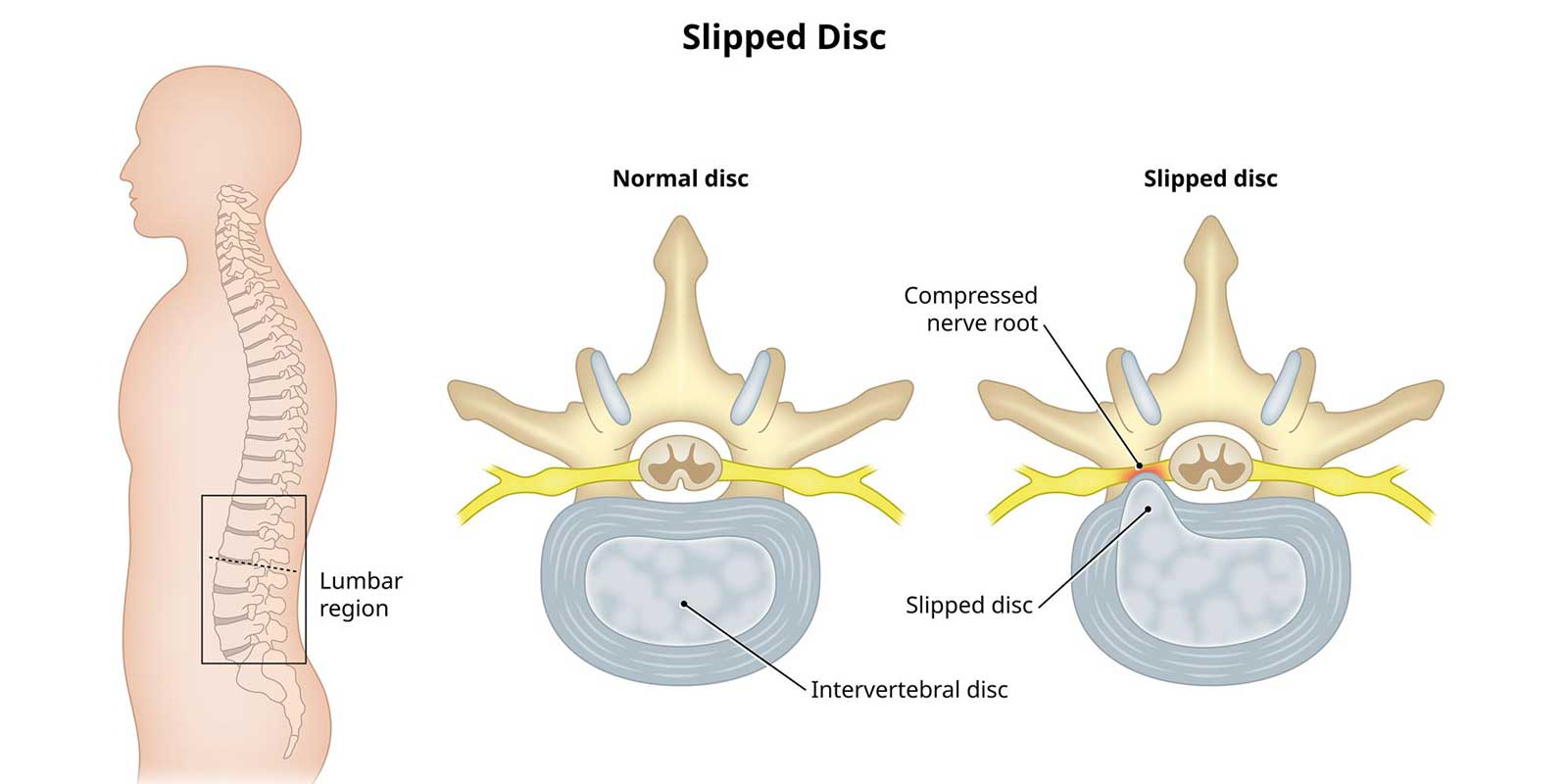Blogs
Do I Need To Get A Slipped Disc Treated?

At our chiropractic office in Spokane, we’re frequently asked: “is a slipped disc really that serious?” Most people hear the words “slipped disk” and either don’t understand what it involves or overestimate its severity. The reality is there are various stages of slipped discs, with symptoms ranging from mild to severe depending on which stage you have reached.
A slipped disc can be a debilitating issue for some individuals, while others may remain unaware that they have one until it’s too late. To gain more insight into this condition and discover the potential effects it can cause, keep reading!
What is a slipped disc?
Don’t be fooled by the term “slipped disc”, also commonly referred to as a herniated or prolapsed disc; it’s quite a misnomer. It conjures up images of something slippery or displaced, however, slipped discs are neither of those things. In reality, this condition involves an injury to one or more vertebrae in your spine that causes pain and mobility issues.
Your spine often thought of as a white zipper-like bone structure, is composed of both bones and cartilage. Between each stacked vertebrae lies a disc that aids in flexibility and works to buffer shock absorption. This disc is surrounded by cartilage which houses the more gelatinous substance responsible for its absorptive capacity.
The spine is a fundamental element of the human body, for it allows us to move around and serves as a structural support. Plus, it’s responsible for allowing our nervous system to properly function. Furthermore, its padding composed of spinal discs – in between each vertebra – is just as significant in maintaining an upright posture and anchoring other parts of our structure.

When a disc slips, the cushioning between one’s vertebrae has been disrupted. The cartilage that holds the disk in place can move and push out of the spinal canal where it should be located. Unfortunately, there is not any space for discs to fit outside of this area; as such, slipping discs could possibly cause discomfort or pain in some individuals.
What are the symptoms of a slipped disc?
When the disc escapes the spinal canal, it pushes against nearby nerves and tissues; usually provoking inflammation and almost always leading to discomfort. A herniated disc can also have several other undesirable effects – due to its protrusion in close proximity to nerve fibers, muscles may become taut or weak; causing aches, knots, back spasms, pain, or unease. All these issues combine together inflicting a multitude of unpleasant symptoms on your body.
1. Localized Discomfort:
- The region surrounding the affected disc often becomes a source of pain.
- A prolapsed disc in the cervical spine (neck area) can relay pain towards the arms and shoulders.
- Conversely, when located in the lumbar region (lower back), discomfort might traverse down to the legs and feet, a condition colloquially termed as sciatica due to the impingement on the sciatic nerve.
2. Numbness or Tingling: Parts of the body connected to the compressed nerves might experience a numb or tingling sensation.
3. Muscular Debility: Muscles connected to the distressed nerves might suffer a decline in strength, leading to issues like unsteady gait or difficulties in grasping objects.
4. Reduced Range of Motion: Stiffness in the back or neck can lead to reduced flexibility or range of motion.
5. Muscle Spasms or Cramping: Affected muscles may spasm or cramp due to nerve irritation.
What are the causes of a slipped disc?
At Back in Motion P.S. Chiropractic, we treat patients with slipped discs almost daily here in Spokane. While these conditions are exceptionally common, many people think the process of slipping a disc only happens suddenly and causes immense pain or immobility—however, this isn’t necessarily true. In most cases, slipping a disc is gradual; it does not occur on just one occasion.
One isolated event, however, can lead to injury and strain that then cause the symptoms of a slipped disc to worsen. That’s when patients recognize something is not right.
Slipped Disc from Lifting
With improper form or misalignment, the spine can be forced out of alignment over time through repeated lifting. This gradual vanishing act may go unnoticed for months, even years until one specific lift brings it all crashing down; leading to a sharp pain in your back along with muscle weakness, tingling, and numbness – a classic sign that you have slipped a disc.
Slipped Disc from Bending
It’s not just lifting objects that can lead to a slipped disc. Over time, repeated bending and twisting of the spine in combination with poor posture or an already misaligned structure can cause discs to slip as well. Without proper muscle support and spinal alignment, your body won’t be able to properly adjust its movements when contorting itself over and over again – this is why hasty movement coupled with bad posture will contribute heavily toward developing a slipped disc from bending.
Slipped Disc from Sitting
Sitting, while not a high-impact activity, can sometimes still cause slipped discs. This may be shocking to some patients who understand sitting as having low risk; however, it is important to consider the effect of prolonged strain on our spinal column and the cushiony disc within. Bad posture or inadequate lumbar support are common causes of this issue – so keep an eye out for those!
Slipped Disc from Running
Unusually, running can cause a slipped disc in regular runners who run at least 20 miles per week or those with prior herniated discs. The shape and strength of the runs might contribute to slipped discs or aggravate pre-existing ones. It’s not strange then for people having regular workouts and a history of slipping discs to get them periodically, either due to their form or unresolved spinal misalignment problems.
Slipped Disc from Falling
Falling, even if it appears to be harmless, is a frequent cause of slipped discs. When the body twists in an attempt to cushion the impact while landing after falling down, vertebral discs can get pushed out of their normal spinal canal positioning. This often produces sensations like soreness and inflammation soon afterward. Eventually, these feelings may develop into chronic issues such as tingling or numbness in your extremities that could last for days at a time with sharp pain being experienced as well.
Many individuals who have suffered a fall and claim that their back “will never be the same” again, are very likely suffering from an undiagnosed slipped disc.
Slipped Disc from Car Accident
Car accidents, regardless of their severity, can often result in a slipped disc. The sheer force of impact during the crash puts an immense amount of pressure on one’s spinal canal which could cause it to compress and lead to a displacement or partial misplacement of discs – resulting in immediate pain or some that may appear later down the line.
What do I do if I think I have a slipped disc?
Don’t ignore a potential slipped disc- take action now! If not treated, it can lead to permanent nerve damage. You would be surprised at how many individuals are walking around with undiagnosed slipped discs; in fact, the symptoms of untreated ones are very similar to sciatica and may even cause lower back pain. Don’t let your condition worsen – act quickly so that you don’t have to face long-term consequences.
If neglected, a slipped disc can cause long-lasting and severe discomfort, including numbness and tingling in the extremities as well as sharp pain. Don’t let these symptoms become permanent – seek treatment immediately to avoid further damage!
Chiropractic Care in Spokane, WA
Are you suffering from a slipped disc and looking for chiropractic care in Spokane, WA? At our chiropractic office in Spokane, we offer expert chiropractic care for slipped discs. Among our treatments are chiropractic care, spinal decompression therapy, scoliosis correction, and accident/injury treatment. Dr. Cameron Weishaar has helped to provide pain relief for thousands of patients suffering from slipped discs, spinal misalignment, and a wide variety of symptoms like acid reflux, neck pain, GERD, shoulder pain, back pain, and more. Call our Spokane chiropractic office today, or contact us here to book your first appointment. We can’t wait to help you achieve your best health yet!
BACK IN MOTION PS CHIROPRACTIC
Add: 1717 W Francis Ave #202 Spokane, WA 99205, United States
Phone: 509-443-3535
Mail: [email protected]

